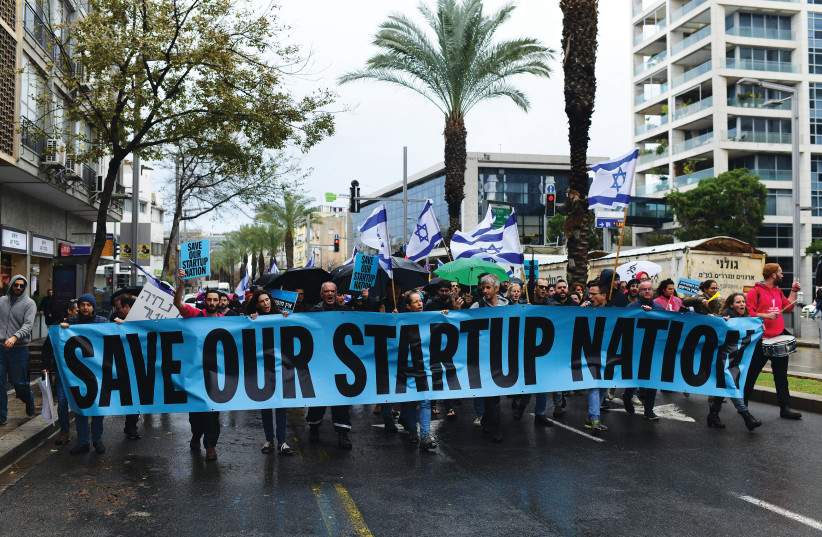One of the prevalent signs at the anti-judicial overhaul protests that have swept the country for the past nine months reads, “Save our start-up nation.”
Like many of the posters and slogans at these protests, such as “Bibi = Putin” and “Bibi Escobar,” which likens Prime Minister Benjamin Netanyahu to Colombian drug lord Pablo Escobar, this one seems overwrought, exaggerated, and hyperbolic.
At the same time, a report released over the weekend by the Start-Up Nation Policy Institute (SNPI), an independent think tank specializing in innovation policy, reveals that the sector’s woes are amassing and are not unconnected from the political instability and the judicial reform debate.
According to the SNPI figures, total investment in Israeli hi-tech in the third quarter of 2023 amounted to approximately $1.7 billion, marking a 40% drop from the same period last year. This marks the seventh consecutive quarter of declining investments since a peak of $9.3 billion in equity investment in the final quarter of 2021.
Moreover, the $5.6 billion investment in Israeli hi-tech during the first nine months of 2023 was a striking 63% less than last year’s corresponding period.

The direction is alarming
The government, understandably, would like to present this as a result of global trends that have adversely hit the hi-tech industry worldwide, including high-interest rates, soaring inflation, and supply chain issues. While there is some truth to this, as hi-tech investments have decreased in Europe and the US – 48% in the US for the first nine months of the year and 43% in Europe – the decline here is more pronounced.
Another factor appears to be at play: political instability and judicial reform.
For months, hi-tech entrepreneurs have warned about foreign investors’ reticence to invest in Israel because of the political instability and concern that the judiciary will lose some of its independence.
If investors are pouring large sums of money into the economy, they want to be sure that, if they face regulatory issues down the line, the judiciary will remain independent and not beholden to the government.
The numbers seem to bear out these concerns. In the first nine months of 2023, 56 foreign venture capital funds were invested in Israel, as opposed to 97 last year – before the judicial reform came into the world – and 95 the year before.
If government spokespeople are to be believed, the drop in numbers is a result of the global economic situation. Protest leaders, however, insist it is a direct result of the judicial overhaul debate.
The truth, as is often the case, lies in the middle. The Israeli tech scene’s challenges are a result of both: negative global trends exacerbated by the self-inflicted wounds of judicial reform and political instability.
If, as the government leaders and the leaders of the opposition and protest movement claim, their actions spring from a genuine concern for the country’s well-being, then it behooves them to look at these figures and draw the necessary conclusions. Continuing down the current path of political stalemate risks tarnishing the crown jewel in the Israeli economy – the high-tech sector, which contributes about a fifth of Israel’s GDP and employs some 14% of the workforce.
Speaking to the UN General Assembly last month, Netanyahu devoted a good part of his address to discussing the blessings and curses of AI.
“For good or bad, the developments of AI will be spearheaded by a handful of nations, and my country Israel is already among them,” he said. “Just as Israel’s technological revolution provided the world with breathtaking innovations, I am confident that AI developed by Israel will once again help all humanity.”
To ensure that this happens, however, investments need to flow freely into Israeli companies so they can take their rightful place in this AI revolution. Returning to political calm may not bring investments back to their record levels of 2021, but it would help Israel at least keep up with the US and Europe.
Investment is the oxygen for Israeli innovation. Choking it off by our own actions is inexcusable.
